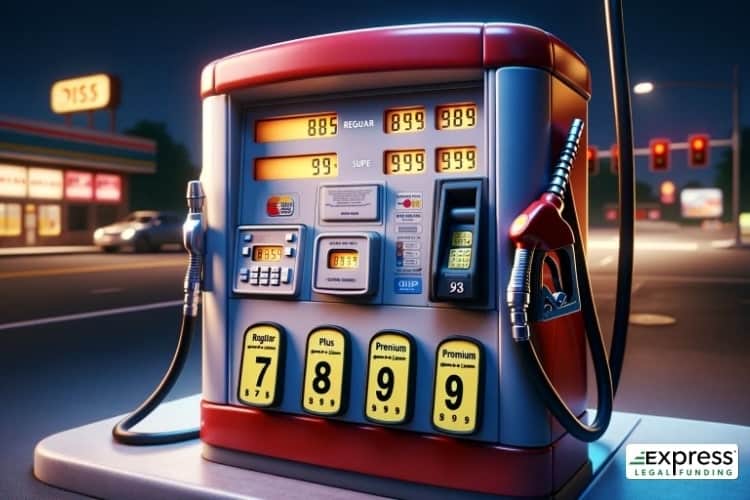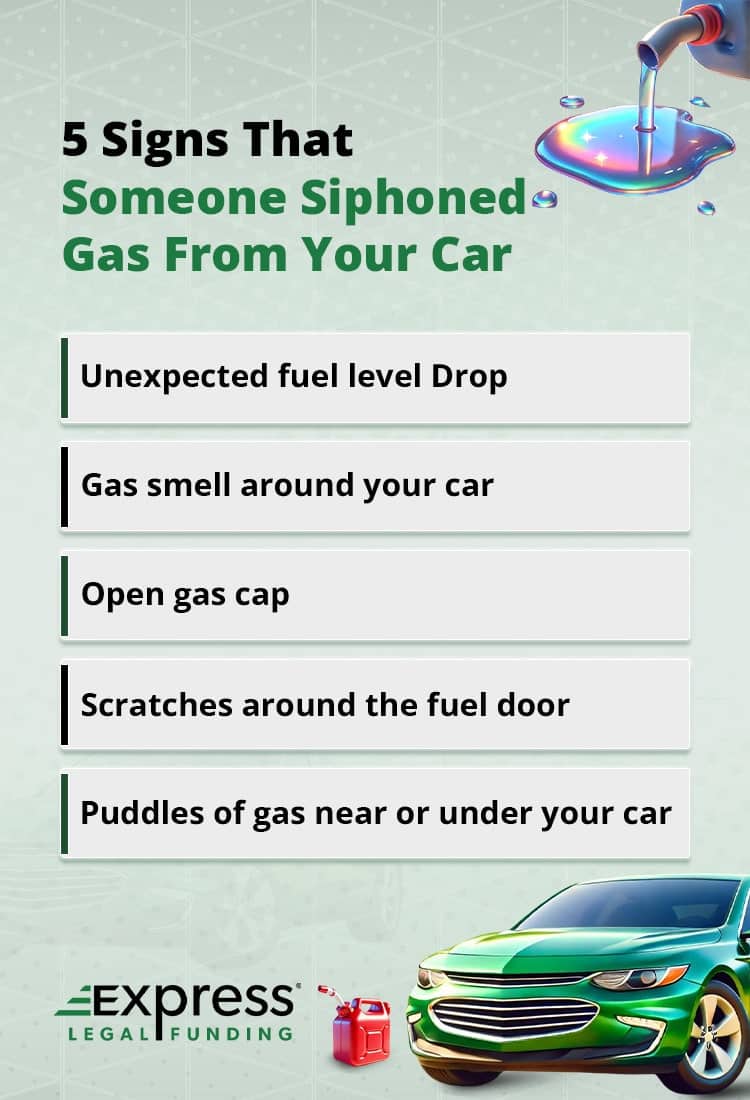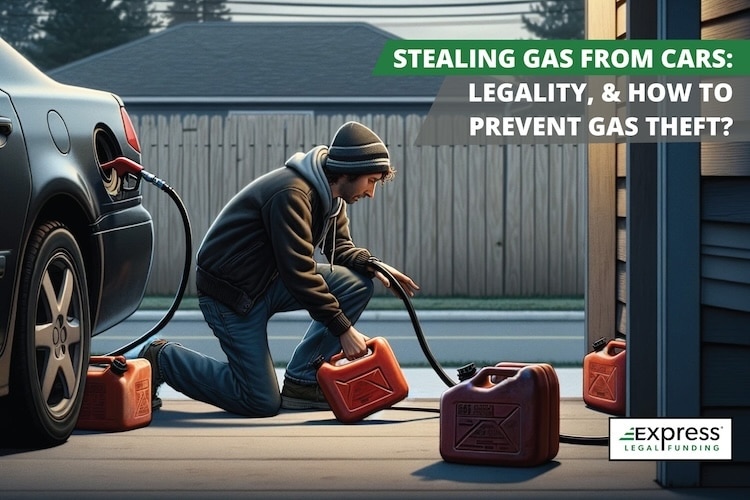
No one likes paying for gas, especially when the cost of gasoline and inflation are on the rise.
History shows that when the global prices of fuel rise, so do the criminal incidences of people stealing gas from vehicles (and making fraudulent payments at gas stations).
California, the state with the highest average cost per gallon of gas in the US, has encountered an upsurge of thieves stealing gas from cars, which will likely worsen as we approach the spring and summer months as more people go on vacations and road trips.
In this article, we take a deep dive into understanding the concept of gas theft, how it happens, the laws governing it, and what you can do as a car owner to prevent it.
Let’s start with the following infographic which covers 7 gas theft prevention strategies you can take.

So, without further ado, let’s examine how people steal gas and the legal implications of doing so.
What Is Gas Theft?
Gas theft is the illegal act of stealing gasoline from a gas station, motor vehicle fuel tank, or pipeline.

Gas Theft From Cars
Gas theft from cars happens when a thief siphons or extracts fuel from another individual’s vehicle without their knowledge or permission.
Siphoning is the most common method gas thieves use to steal fuel from cars and is typically seen during times of high gas prices, inflation, or economic downturns.

What Is Siphoning Gas From Cars?
The specifics of how criminals siphon gas from cars involve the thief inserting a flexible plastic tube into the vehicle’s gas tank and utilizing the physics principles of air pressure and gravity to transfer the siphoned gas into a container.
Is Siphoning Gas Dangerous?
Yes, even when done legally, siphoning gas is dangerous, posing many safety hazards and severe health risks resulting from inadvertently swallowing gasoline or inhaling its fumes. Gas contains toxic ingredients known as hydrocarbons.
According to the National Library of Medicine, several cases of gasoline poisoning have happened to people trying to suck gas from a car fuel tank using a hose or tube.
Gasoline Poisoning Symptoms
Gas poisoning can cause many severe and even potentially fatal symptoms in the following regions of the body:
- Airways and Lungs – Difficulty breathing and throat swelling
- Eyes – Pain and loss of vision
- Ears, Nose, and Throat – Pain
- Stomach, Esophagus, and Intestines – Burns, pain, vomiting, and blood in stools
- Cardiovascular system – Rapid drop in blood pressure leading to shock
- Nervous system – Seizures, dizziness, drowsiness, feeling of being drunk (euphoria), headache, and staggering
- Skin – Burns and irritation

Gasoline is a highly flammable liquid, which also makes the act of gas siphoning hazardous due to the possibility of sparks, fire, or explosions.
Drilling Holes In Gas Tanks To Steal Gas
Most modern cars have various forms of anti-siphoning technology installed, which, while that has made it more difficult for thieves to steal gas, has led to more aggressive methods used to steal gas.
By drilling holes directly into a vehicle’s gas tank, thieves attempt to drain and collect the gas as it spills out.
While this brute force method is quicker than siphoning, it is more destructive, messy, dangerous, and financially costly for the vehicle owner.

The high flammability of gas makes drilling holes in gas tanks very dangerous. A simple spark can ignite the leaked fuel, causing an explosion.
How Much Does It Cost To Repair a Hole In Gas Tank?
In cases where gas thieves have drilled a hole in your fuel tank, the repair cost can be quite hefty. The average repair expense for replacing a fuel tank can range between $1,400 and $1,600, including parts and labor costs.

Is Gas Theft Illegal?
Yes, stealing gas is illegal and punishable by law in all fifty states and Washington, DC. Using a siphon to steal fuel from someone else’s car’s gas tank is categorized as a larceny offense (property theft, i.e., hurto en tiendas), which is a crime.
Gas theft can result in the following penalties and sentences:
Punishments For Stealing Gas
- Jail time
- Libertad condicional
- Multas
- Restitución
Learn more about larceny offenses in America in our new guide, covering shoplifting statistics and trends with data based on our 2024 survey data focusing on retail theft from the consumer perspective.
Is Stealing Gas a Felony?
The classification of stealing gas as a delito grave o delito leve depends mainly on the value of the gasoline stolen.
In cases where the value of the stolen gas exceeds a certain amount, known as a felony threshold, the crime is upgraded to a felony, leading to harsher penalties for the offender.

The felony thresholds range between $200-2500, depending on the state. New Jersey has the lowest minimum felony amount at $200, with Texas and Wisconsin being tied for the highest thresholds of $2500.
The majority of states have a minimum threshold for felonies between $1,000-$1,500.
Gas theft will typically be charged as a misdemeanor and not a felony offense since the average cost per gallon of gasoline and the inherent size limitations of motor vehicle gas tanks.
How To Tell If Someone Is Siphoning Gas From Your Car?

Detecting gas theft has occurred from your car can be tricky. However, there are certain signs that can indicate someone has siphoned your gas:
- Unexpected Fuel Level Drop: Keep a close watch on your fuel gauge. If it shows a sudden drop in fuel level without corresponding usage, it might indicate gas siphoning has occurred.
- Gas Smell: If you notice a strong smell of gasoline around your parked vehicle, it could be a sign that your gas tank has been tampered with.
- Visible Signs: Look for physical signs like an open fuel cap, scratches around the cap from it being forced open, or puddles of gasoline under your car.

How To Report Gas Theft?
If you’ve witnessed a gasoline theft or suspect that you’re a victim of your vehicle’s gas being stolen, you should report the incident to the police by taking the following actions:
- Document any pruebas and take note of any suspicious activities or individuals in the vicinity. Take photos of the scene (i.e., a loose gas cap and gas drippings on the pavement).
- Call 911 to provide law enforcement officials with a detailed description of what happened during the incident, including answering their follow-up questions about the gas theft incident.

How To Prevent Gas Theft From Cars?
There are several automotive security and gas siphon prevention measures you can take as a car owner to protect your vehicle from fuel theft:
Park Strategically To Prevent Gas Siphoning
- Always park your car in a secured garage whenever possible.
- Choose well-lit, high-traffic areas for parking your vehicle outside.
- Position the fuel door side facing a main road instead of towards the middle of a parking lot or a desolate alleyway.
- For mall parking garages, try to park your car near other motor vehicles or the elevators where people frequently enter and exit instead of leaving it by itself on the garage’s top floor.
- When possible, aim to park your vehicle in a way that limits access to the location of the gas cap and fuel tank opening (close to a fence), making it tricky for thieves to insert a siphon.
Install Gas Theft Prevention Devices
Invest in anti-gas theft devices like locking gas caps or fuel anti-siphoning devices that can deter thieves and make it difficult to steal your gas quickly.
Turn On or Install a SEER Proximity Alarm System
Turning on or installing a proximity alarm or SEER (smart entry-exit recognition) car security system in your motor vehicle can help prevent fuel theft by detecting when an unauthorized individual comes within a certain distance of the car.
If someone approaches your car in hopes of siphoning gas, the system will trigger the car alarm, drawing attention to the area and scaring off any would-be thief with the noise.
This added layer of auto theft protection makes it easier to catch gas thieves as they approach your car before they can even begin siphoning gas.
Use Security Cameras
Install security cameras in your parking area to record and monitor the location of your vehicle. In general, thieves and burglars tend to avoid areas under surveillance, as they don’t want to get caught.

Install Motion Detection Alarm In Driveway
A movimiento detection alarm is a security device that uses sensors to detect movement in a specific area, such as a home driveway.
When movement is detected, the alarm is triggered, which can activate lights, sound an alert, or even send a notification to your mobile device, thereby providing an early warning of potential intruders or visitors approaching your parked vehicle.
Types of Anti-Gas Theft Devices
Anti-gas theft devices like locking gas caps and fuel anti-siphoning devices can effectively deter potential thieves (for vehicles that do not have fuel cap release buttons installed).
Locking Gas Caps For Fuel Security
A locking fuel cap functions by having a built-in locking mechanism that engages when the key is turned, securing the cap in place and preventing it from being opened without the key.

Not only does it help protect your car or truck from gas theft, but it also protects against other types of tampering, like people inserting foreign objects into the fuel tank without you knowing it, which can seriously damage cars.
Local stores like AutoZone sell lockable gas caps.
Anti-Siphon Devices
Anti-siphoning devices like the Gas Bandit Blocker, manufactured by Stanco Metal (for older cars that do not have anti-siphon filler necks), are designed to prevent the insertion of a siphon tube into the gas tank.
They can be a worthwhile investment to safeguard your motor vehicle against gas theft. The installation of the device only requires a long-head screwdriver.
How the Gas Bandit Blocker Prevents Gas Theft [Video]
The Gas Bandit Blocker is sold as a two-pack and can be purchased for $9.95 (excluding shipping and handling) on the official product website.
The same two-pack costs $19.99 on Amazon, which includes the cost of shipping.
In Summary: Preventing Gas Theft Head-On
In conclusion, thieves stealing gas continues to be a significant challenge for businesses and individuals with a litany of economic and safety implications.
Remember, staying aware of the risk of gas theft and taking preventive measures can help protect your vehicle and your wallet. Stay alert, track your fuel levels, and report any suspicious activities to law enforcement.

Lastly, we want to briefly explain who we are and what we do as a company.
As a prominent and reputable legal funding company, our team at Express Legal Funding specializes in providing fast financial support to plaintiffs involved in various lawsuits and legal claims through our financiación previa a la liquidación service.
We give them immediate cash, helping them cover their expenses, like paying for vehicle repairs after a car crash or for the cost of pumping gas, as they need a working car to get to their treatment, whether that be getting inyecciones de esteroides for pain or attending fisioterapia.
Call us or apply online to learn more about how legal funding from us can help you stay financially afloat and move forward in your life while your injury attorney represents you in your demanda.




